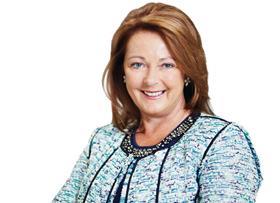CEO describes 2017 as “an extremely challenging year” but says plans in place for recovery

Shares in Interserve dived today after the group announced losses of £244m, including a further writedown of £35m on its Energy from Waste business.
Investors baled out of the group’s stock, sending it down 17% to 89p before recovering to 91p after the firm revealed the loss on flat turnover of £3.25bn, while net debt at the end of December last year ballooned to £503m.
Group operating profit slumped 52% to £75m, hit by poor performances in construction, which despite a 20% rise in turnover to £1.1bn saw a loss of £19.4m in the UK, wiping out a similar profit made in its international business. Its support services arm reported an operating profit down 54% at £42m on turnover 2% lower at £1.7bn.
Chief executive Debbie White warned construction revenues would fall in 2018 as it sought to weed out unprofitable work and that Interserve was looking to restore its fortunes after kick-starting a review of the operation.
It has identified £40m to £50m of savings she believed will drop through to the bottom line by 2020.
She singled out construction which had experienced “challenging market conditions and pockets of underperformance”, as well as suffering historically “from poor decision-making in project targeting and inadequate project control, reflected in the significant provisions we have made against a number of outstanding projects following our contract review”.
Speaking about Energy from Waste, White said the group expected to complete the remaining projects in the first half of 2018, but added that “risks clearly remain and we continue to expend every effort to bring these projects to a satisfactory conclusion”.
Describing 2017 overall as “an extremely challenging year” she said the group had a better idea about what it needed to do than before she arrived last September from outsourcing group Sodexo.
“The business was really unclear about what its role was and how we worked together. There was no coherent approach to the market,” she said.
Interserve’s ‘Fit For Growth’ programme will overhaul numerous business practices, White said. Previous purchasing strategies, the group’s structure and the cost choices made, “will not enable us even to achieve margins consistent with our peers in the industry”, she added.
White said the business was not paid to “re-invent the wheel” and would seek to sub-contract far less work than in the past and focus on self-delivery. “I was surprised at the level of sub-contracting going on when I arrived. Margin on margin just does not work.”
Interserve will have a “laser-like focus” when it comes to bidding for work and would be “much more selective in our bidding processes”, she said.
Every potential project would go before her and finance director Mark Whiteling for sign-off, she said. Whiteling joined Interserve in October last year from technology products group Premier Farnell, replacing Tim Haywood.
Kevin Cammack of Cenkos Securities said of the results: “This was a horrible set of numbers but well trailed and the £834m refinancing has been duly formally completed which at least secures the financial health of the group whilst we see if the new management’s recovery plan has legs, is deliverable and creates value for shareholders.”




























No comments yet